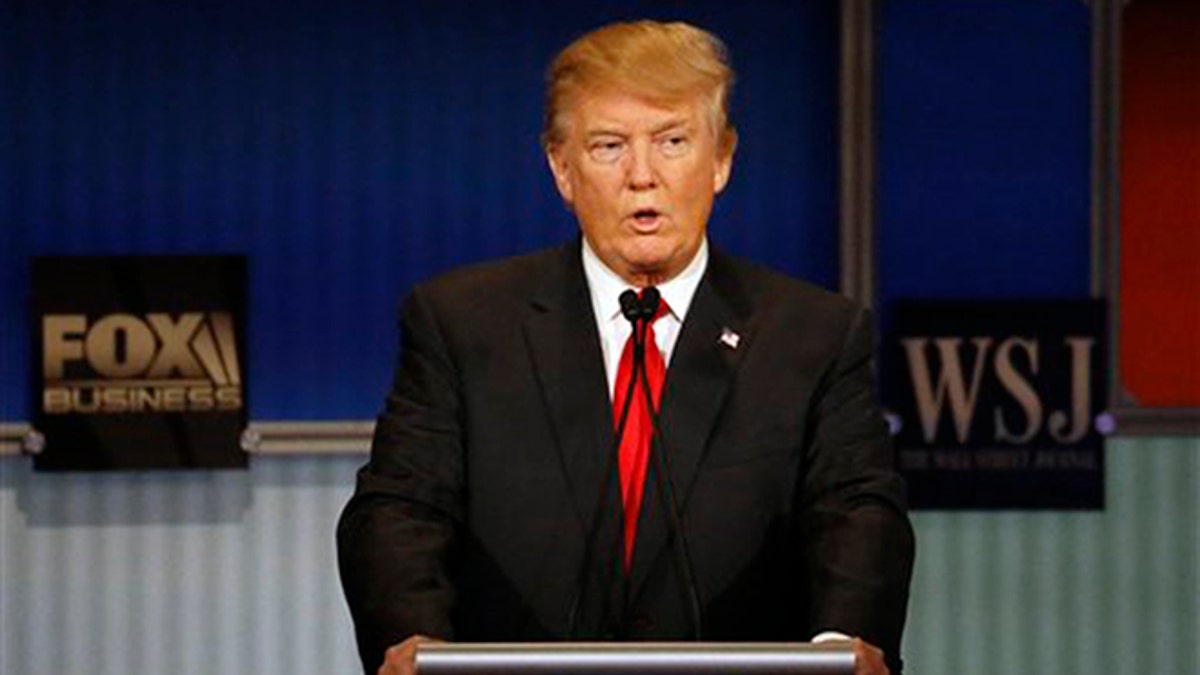
Donald Trump speaks during Republican presidential debate at Milwaukee Theatre, Tuesday, Nov. 10, 2015, in Milwaukee. (AP Photo/Morry Gash)
Tuesday’s Fox Business debate in Milwaukee began with a brief mention that the 2016 Republican presidential field had gathered across the street from where Theodore Roosevelt took a bullet in the chest over a century ago.
About that shooting: despite the wound, TR continued with a scheduled speech at the Milwaukee Auditorium. One sentence into his remarks, TR told his audience, “I don’t know whether you fully understand that I have just been shot.” He then unbuttoned his vest to reveal both a bloody shirt and a new political identity: “It takes more than that to kill a bull moose”.
About the FBN debate: it ran 45 minutes longer than Roosevelt’s speech; none of the eight candidates on the primetime stage ended up in intensive care. It’s going to take more than such gatherings to kill the likes of Donald Trump, Ben Carson and Ted Cruz’s insurgencies.
This marked the fourth of the GOP’s debates and a break in the action until a Dec. 15 gathering in Las Vegas – Nevada being the fourth stop on the GOP primary trail in 2016.
Here's something for establishment Republicans to ponder: Trump thinks he can win this race and plans to act more like a statesman than a showman.
Here are five observations:
1. Credit goes to the moderators for sticking to policy other than a brief detour into Carson’s troubles this past week. A few topics did go overlooked: health care, savings, and the retirement economy; what the two candidates who worked in banks (Jeb Bush and John Kasich) learned from their stints in high finance.
2. A tip of the hat to the tech-support team at Fox Business for a glitch-free Internet feed (not everyone gets the FBN, including my cable system here at Stanford University).
3. Early in the proceedings, Bush’s missed chance to score big on inclusiveness. Bush noted the impracticality of Trump’s wish to deport 11 million illegal aliens. But he didn’t get the right-the-boat sound bite his struggling candidacy needs (saying a few words en Español would have helped show that Bush is genuinely empathetic, plus it really annoys Trump).
4. Marco Rubio deftly defended his proposed increase in the child tax credit. Small wonder: The Wall Street Journal, the debate’s co-sponsor, ripped it back in June. Credit good staff work for anticipating the question – it’s how debates are won or lost.
5. Carly Fiorina spent 90 seconds calling for federal zero-based budgeting without explaining it. Coke Zero, most people get. Zero-based budgeting? Too wonky for the low-information crowd. Fiorina’s much better when she keeps it simple – like pointing out that her encounters with Putin aren’t limited to green rooms.
But the big takeaway: What happened to Donald Trump? Aside from a swipe at Fiorina for interrupting, he wasn’t his usual bad-boy self.
I have a theory that the Trump presidential campaign is a lot like a New York baseball crowd: There are some not-into-it wealthy people who pay a small fortune to arrive late and leave early; others who live and breathe the game; still others who think their ticket entitles them to slur the ballplayers and their maternal ancestry.
In the 24 hours culminating with the FBN/WSJ debate, Trump published an op-ed on Chinese monetary policy in the Wall Street Journal, questioned Ben Carson’s integrity, and pretty much kept his temper and ego in check while the cameras rolled.
In the last week, he has filed candidacy papers in New Hampshire and hammed it up on "Saturday Night Live."
Groucho Marx observed: “Politics is the art of looking for trouble, finding it everywhere, diagnosing it incorrectly and applying the wrong remedies.”
On Tuesday night, Trump persisted with the wrong remedies (a Mexican border wall that will never happen).
But in Milwaukee, Trump didn’t go looking for trouble. Maybe it was the low-key line of questioning. Or it could be that after four encounters, Trump’s getting bored with the routine – and even himself.
Or, something more frightening for establishment Republicans to ponder: Trump thinks he can win this race and plans to act more like a statesman than a showman.
Once upon a time in America, Fridays meant "Fight Night" on television. Not that Tuesdays have become a substitute. None of Milwaukee’s expected fireworks materialized. Trump didn’t continue with his attacks on Carson’s character. Nor did Bush go after Rubio.
Imagine that: a business network’s debate that was... all business.








































